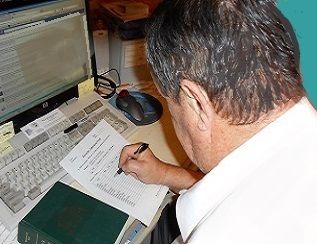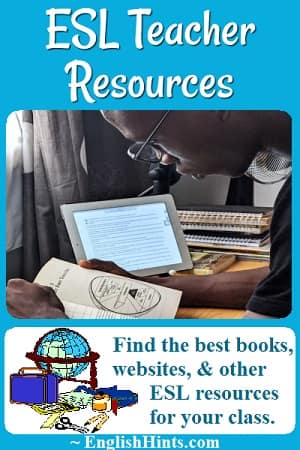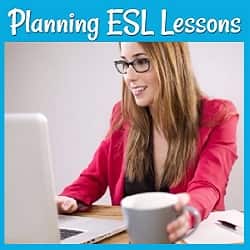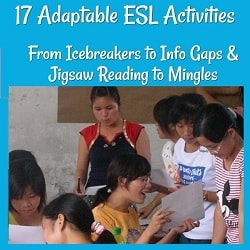Exceptional ESL Teacher Resources
The most important ESL teacher resources are the teacher’s own imagination, knowledge, and interest in his or her students.
Textbooks are handy but not essential. (If you need to get by without a text, don't despair! There are so many useful materials online!)
Go directly to the sections on books for teaching ESL, websites with material for ESL teachers, sites especially good for lesson plans, or sites students can use.
Your most basic resources are almost free:
Gestures, facial expressions, and realia (real objects) are useful, especially for beginners. So are pictures.
There are many other free teaching aids that can be improvised as needed.
Start with a collection of old magazines or catalogs with pictures. Add some scissors, paper, pencils, and markers to provide hours of practice.
Students can choose, cut out, and label pictures of the vocabulary they are studying. They can tell a partner what is happening in a picture or make up a story about it. You can re-use those pictures later for review or for another class.
Use classroom objects, clothes, or foods for conversation starters or guessing games.
There are also some websites and books that can be great time-savers.
The ESL teacher resources listed on this page are the ones I have found the most helpful.
(I taught adult ESL classes of various durations and levels, especially multi-level. Some ran for 2 1/2 to 3 hours several times a week. Others were 7 hours/day, 5 days a week classes that lasted for 6 months. We had textbooks, but we needed a variety of other ESL resources to supplement it for the longer classes!
I also taught an ESP class for Mexican nurses. They were studying for the NCLEX exam so they could work in the U.S. If you are working with foreign health professionals who want to work in the U.S., contact me. I can suggest some great lesson plans and materials.)
Some of the Most Useful Books for ESL Teachers
Teaching Adult ESL: A Practical Introduction by Betsy Parrish. If I had access to just one ESL teacher resource, I think I’d choose this one.
Amazon calls it a classic, and I found it invaluable when I started teaching ESL. (I had a BA and several university courses on TESL but didn't have an ESL or EFL certificate at the time.)
It is an excellent summary of communicative teaching techniques. You'll find lots of practical suggestions and ideas to apply in the classroom.
If you don’t have textbooks or a curriculum available, you might find a teacher’s edition of a text you like useful for curriculum planning.
My school used the Stand Out! series. It’s not my favorite for students, but it provides valuable lesson planning strategies in the teacher edition for each level. (It also has suggestions for timing, integrating grammar into the lessons, and extra activities.)
You likely could find an inexpensive used edition of your level’s Stand Out! or another textbook online. (I bought and used some to get ideas before there was much available online. Do look at several before buying-- they vary quite a bit in approach and usefulness!)
Another excellent ESL resource: Penny Ur & Andrew Wright, Five-Minute Activities. (It's a short book full of ideas for warm-ups, reviews, or a change of pace when your lesson finishes early.)
Penny Ur has written several other useful books. Grammar Practice Activities is another classic. It has hundreds of communicative exercises for various grammar points. (Amazon.com provides a “Look inside” for both these books and the one below.)
The Oxford Picture Dictionary's Classic Classroom Activities has great ideas and reproducible pictures. It's not cheap, but one copy could serve an entire school as you have permission to reproduce all pictures. (Amazon Marketplace has some used copies of the first edition-- the one I used, and can highly recommend-- for very little.)
The best grammar reference I’ve seen is Michael Swan’s Practical English Usage. It’s well written and thorough.
ESL Teacher Resources: Websites

I hope you'll find the lesson plans and printable pdf worksheets and lessons on EnglishHints helpful.
The list below includes some other useful websites I have found. (All the links below will open in a new window, so you can return here to check out another.)
Check out this list of 10 great ELT sites. They have lesson ideas, pronunciation, grammar, collocations, professional development, IELTS prep, and more. I've already used and appreciated several sites-- and look forward to trying the others!
Ivy Panda has a page listing 150 useful English grammar pages on social media. (Their other pages are worth checking as well.)
Resources on ESL Flow
ESL Flow (especially this page on Mingles-- scroll down for that) has many interesting ideas for lessons, activities, and worksheets. It also links to other sites with worksheets-- many you might not find on your own.
Check out the Ice Breakers. “Never have I ever” is a great getting-to-know-you game for a high intermediate class. It's also good for present perfect tense review.
Farther down the icebreaker page there are links to pages with great ideas for teaching with pictures. I loved the Picture Dictation lesson guide. Check out their samples of student drawings made while listening to descriptions.
The “Lots of Pictures” link (or “Using Pictures” from the home page) offers the best assortment of pictures for ESL conversation activities I’ve seen.
(I wrote the above in the days before Pixabay and other royalty-free and actually free image sites. There are more options now. Pictures designed especially for ESL still make valuable conversation-starters.
ESL Flow has many more links to vocabulary, grammar, and reading pages from all over the Internet. I haven’t found many actual lesson plans (there are a few on New Year’s Resolutions), but there are lots of lesson ideas.
Useful Lesson Plan Sites
Some excellent sites for Lesson Plans are:
iteslj: The Internet TESL Journal has a huge collection of lesson plans (some detailed and some not). It also has conversation, activity, and game ideas, and links to ESL readings. (It's no longer a functioning journal, but it keeps its archives available.)
The British Council TeachingEnglish.org has more useful articles, activities, and lesson plans. I was very impressed by this article on Making Reading Communicative. It suggests strategies to use before, during, and after a reading activity for maximum language practice.
Tefl.net has fantastic plans (in the “Topic Worksheets” section). Below those are some excellent articles on teaching ESL. They also have ESL blogs from all over the web available via their top navigation.
Bogglesworld has lots of worksheets and activities. See their simple directions for Odd Man Out, Find Someone Who, For & Against, and discussion topics. (An example: "how life has changed in the last 50 years"-- to practice comparatives.)
They have lesson for young learners, business English, and phonics. They also have an invaluable section on Survival ESL. (It has lessons to prepare beginners for travel or living in English-speaking countries.)
A visitor to EnglishHints suggested Start Local. It lists many classic ESL resources plus sites I had never seen. One is ESL Blues (with an impressive number of practice activities. I've linked to it separately, since the link in Start Local didn't work when I tried it most recently.).
Here's a helpful summary of an ESL/EFL teachers' discussion on textbooks. It gives suggestions for adapting when expected to use a textbook too much.
(I loved idea 19. Try giving students a treasure hunt through the text. This way they're at least familiar with the parts you don't have time or inclination to emphasize.)
Near the end of the article are links to more ideas. Check them out for ways to get the best from books without feeling enslaved to them.
There are many more excellent ESL teacher resource sites online. There are also some poor ones. Many sites have good content but are hard to navigate or so covered with ads that it’s hard to find the content.
That’s why I didn’t link to ESL-Lounge or about.com’s ESL pages here. They do have some excellent lesson plans, worksheets, and tips, if you don’t mind dodging the ads.
When you have time, explore more on your own. The tefl.net site above has excellent ESL resource pages that would be a good place to start. There are some great teacher blogs, as well. Happy hunting!
Websites Your Students Can Use

I just read some great suggestions for helping students avoid the “summer slide.” It’s great if the school has a book give-away program or if students have access to a library.
A class field trip to the library is even better, if possible. That way they can see for themselves what’s available and how helpful librarians can be. You can encourage parents to take their children to the library, too.
I took several adult classes to the library. We had a treasure hunt, using a worksheet to mark locations and information to find. It was a popular activity!
USALearns offers several free English courses. Students can access them on their own or use them as members of your class if you set up a class there.
I enjoyed using many of their Intermediate videos, worksheets, and activities. They have added courses for beginners and for Intermediate reading. The courses have explicit instruction videos, so students know what they need to do next.
See this high school ESL teacher's discussion of some helpful sites that allow teacher monitoring. This allows students to get extra credit for studying online. (He uses it to keep students practicing their English over the summer.)
(Monitoring them requires teacher set-up, but he says it doesn’t take long. He has made arrangements with colleagues so students who change teachers can still get credit.)
He also has a list of the best best Beginner, Intermediate, and Advanced ELL sites for students to use on their own. Many are new to me, but I can recommend California Distance Learning, Pumarosa, and VOA Activities. Several others seem well worth investigating. My Online Reading page has other suggestions. Resources for English Language Learners will have others, soon.
Home> ESL Lesson Plans for Teachers> ESL Teacher Resources.
Didn't find what you
needed? Explain what you want in the search box below.
(For example, cognates, past tense practice, or 'get along with.') Click to see the related pages on EnglishHints.
| site search by freefind | advanced |







